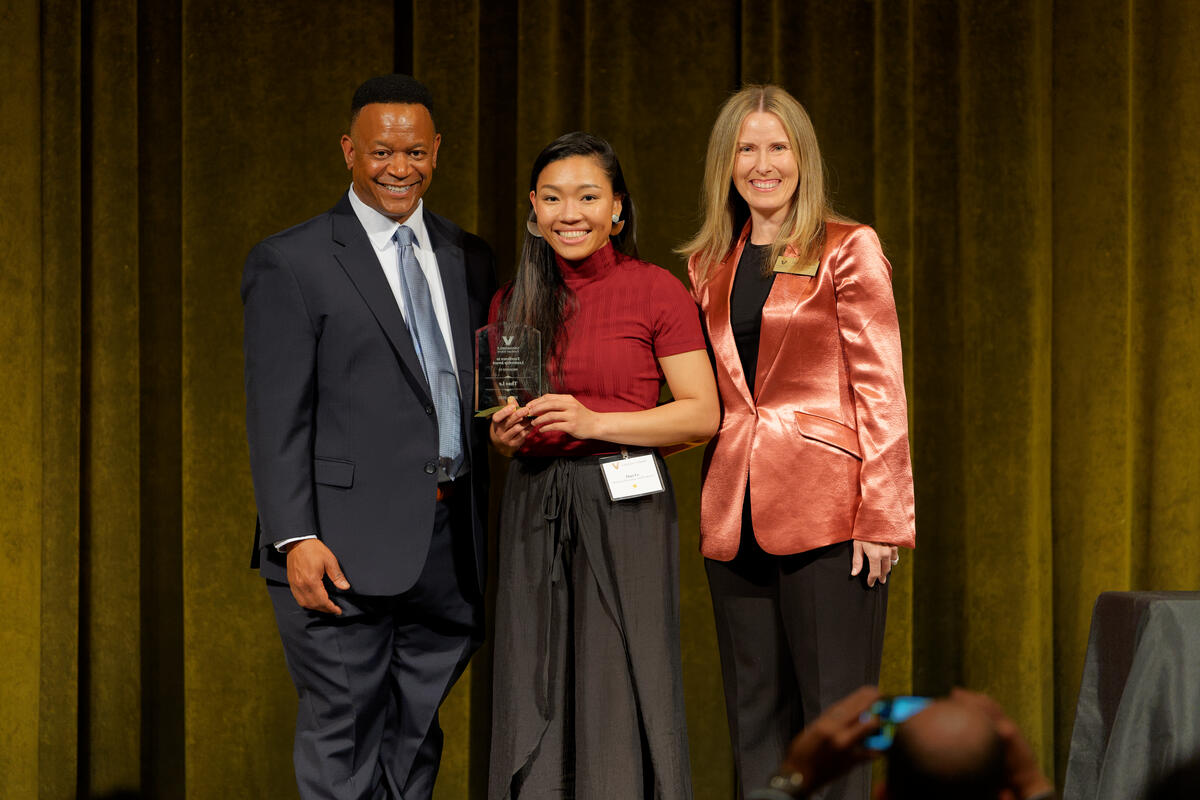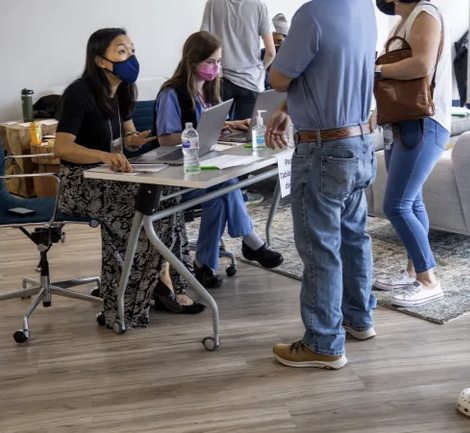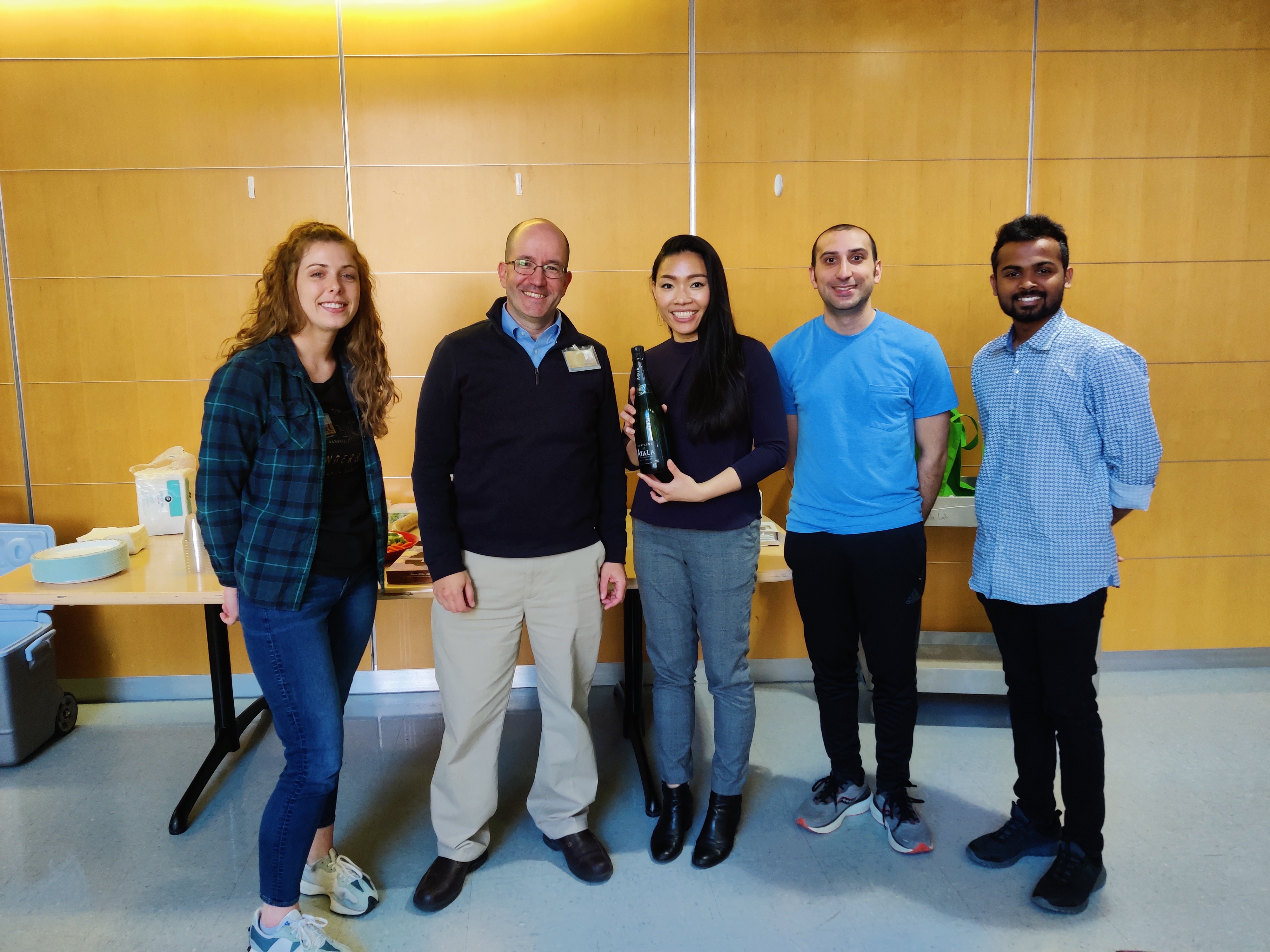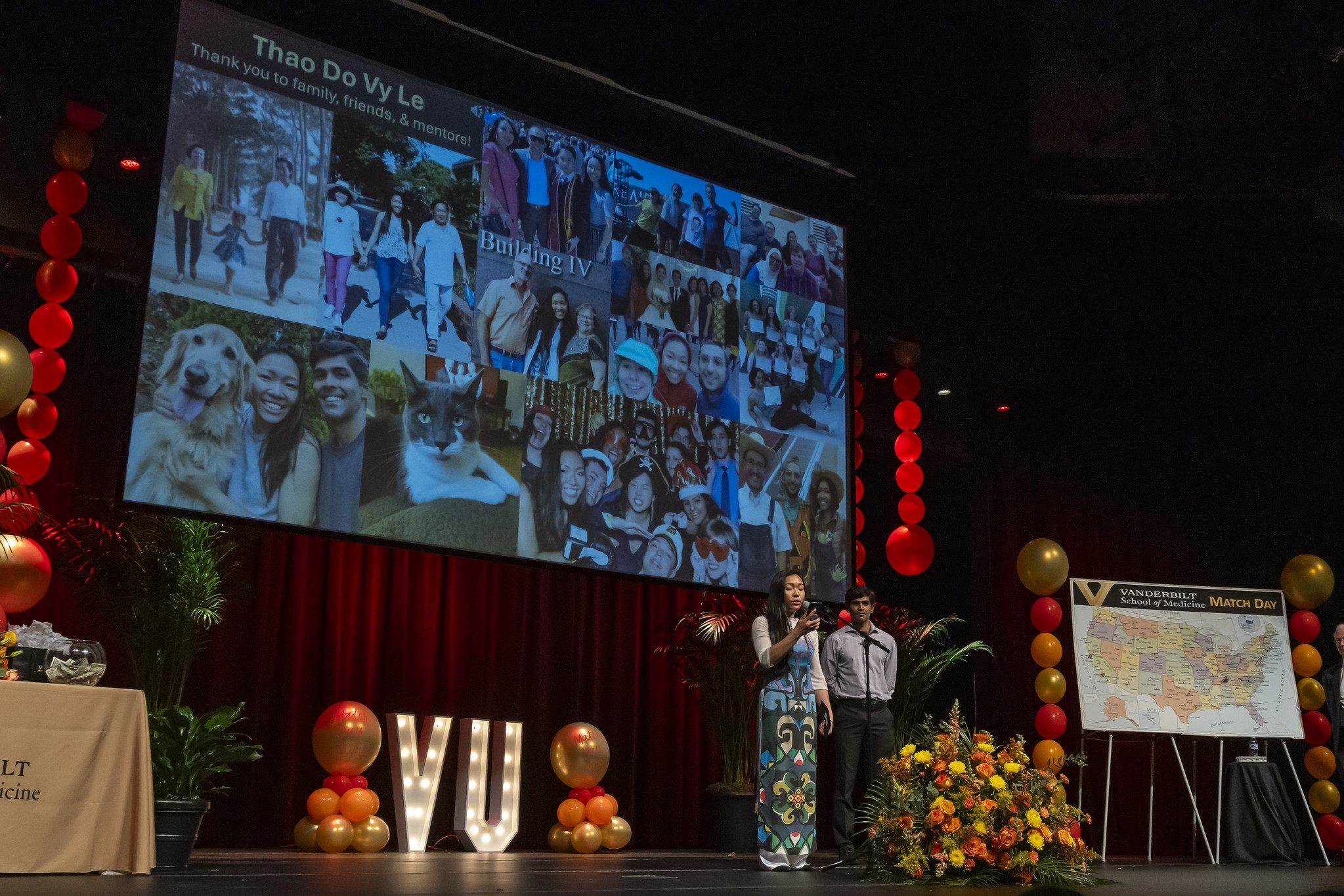As she approaches graduation, M4 Thao Le, Ph.D. reflects on finding her way and unlocking her passions at VUSM
By Kyra Letsinger

M4 MSTP student Thao Do Vy Le, Ph.D., was always ready to take risks. From a young age, when it came to new opportunities, she was not afraid to take a leap of faith to reach her goals. At just 16 years old, she took a larger leap than she ever could have imagined, physically and metaphorically; she left her home and family in Ho Chi Minh City, Vietnam, to participate in a cultural exchange program in the United States. For many, this transition may have been too overwhelming, but Le thrived, becoming close to her host family in Kansas and further excelling academically at her boarding school in Minnesota. Her risk had paid off, just one of many in her journey.
Le followed her intuition and took on a new unknown by continuing her education at Hampshire College, a small liberal arts college in Amherst, Massachusetts, that prides itself on its out-of-the-box academic model.
“You don’t declare majors or minors; there were no grades, no final exams,” Le said. “It’s a quite experimental college, which, in retrospect, is a lot like Vanderbilt School of Medicine with its alternative curriculum and grade structures.”
Luckily, Le would once again find her risk worth the reward as she was able to take a wide array of courses in anthropology and biomedical sciences. These academic endeavors were catalysts for her interest in biomedical research, a direction she had never previously considered. Inspired, she already had her sights set on her next endeavor as she approached graduation: She had applied and gotten into Vanderbilt University’s Interdisciplinary Graduate Program (IGP) in Biomedical Sciences and was going to deep dive into research.

Le’s passion for medicine and humanity inspired her work in the IGP program and acted as the driving force in her success as a biomedical scientist-in-training. While she knew she wanted to continue her research pursuits, Le also found herself wanting to further train in the area that truly gave her research purchase; the field of medicine. As her first year in IGP came to an end, Le made the life-changing decision to apply to Vanderbilt University School of Medicine’s (VUSM) Medical Scientist Training Program (MSTP), where she could combine her interests in biomedical research and working directly with those in need. In trusting her gut, Le put herself on a path to become the upcoming medical school graduate, physician-in-training, and exceptional person she is today.
A Bumpy Road Uncovers a Calling
Entering her M1 year, Le was eager for her next chapter. But despite preparing to take on the transition with confidence and an open mind, Le found herself struggling almost immediately. The pace and pressures of medical school weighed heavily on her.
“The transition was quite difficult. To be honest, because I had been in a system where there were no grades, no exams, I didn’t really have a lot of standardized testing experience,” Le said. “I struggled quite a bit during first year to adjust to the fast pace and the style of learning.”
Despite her impressive background and typical ability to trust her gut, Le felt an overwhelming sense of imposter syndrome and a deep sense of isolation. Le would soon come to face a harsh truth that would change not only her first year but the entirety of her medical school journey: She needed to ask for help, and immediately, she turned to the same people who had made her feel comfortable enough to join the VUSM community in the first place, trusted faculty members.
One of the most impactful support systems Le found was in Senior Associate Dean of Medical Student and Alumni Affairs Amy Fleming, who would ultimately become one of her core mentors in medical school. Together, the two worked to find ways to address her mental health struggles and academic concerns head-on.

In addressing her own mental health concerns, Le found an improved medical school experience and developed a strong interest in mental health advocacy, especially in the academic setting. This newfound passion would become a driving force in her time as a student, leading her to take on roles as a student life liaison for the Graduate Student Council, co-chair of Vanderbilt’s Student Care Network Student Advisory Committee, and the MSTP and University liaison for VUSM’s Student Wellness Committee.
“Stigma against mental illness or mental health conditions is something that I feel passionate about, and that started when I began medical school,” Le said. “That’s something that I’ve been working on with Dean Fleming and other students, finding ways to encourage people to ask for help and normalize needing psychiatric care during any part of our training. It’s a strength, not a weakness, to reach out.”
Driven to Serve the Overlooked
In her second year, Le quickly found her footing both personally and academically. Now able to learn in a more hands-on environment, she thrived during her FCC clerkship rotations and while volunteering for Shade Tree Clinic (where she would eventually become co-director of the psychiatric clinic). The culmination of these experiences would ultimately lead to her chosen specialty, psychiatry. As she headed into the graduate studies phase (G Phase) of the MSTP program in her third year, Le combined her newfound love of psychiatry and the inner workings of the brain with and her previous research interests in metabolism and decided to pursue her PhD in Molecular Physiology.

Just as she began to explore this differing path, the roadblock of a lifetime occurred: the COVID-19 pandemic. Rather than allow this unprecedented roadblock to hold her back, however, Le jumped into action. She co-led the student-led COVID-19 response team and helped organize several different initiatives to support the Vanderbilt University Medical Center (VUMC) community, including meal drives and volunteer babysitting services for healthcare workers. Her efforts even stretched outside the Vanderbilt community as she volunteered with Nashville vaccination clinics that would serve hundreds across Middle Tennessee and worked with the Harvard Health Literacy Project to translate vital health information into Vietnamese.
As Le became more involved in public health efforts, she began to see a frustrating pattern where people lacked access to medical care and the basic necessities to live a healthy live. This was a cause for alarm in Le.
“The pandemic revealed to me the stark disparities among the populations that we serve, both across Nashville and worldwide, Le said. “We can discover and make vaccines, but if marginalized populations still have decreased access to those essential services or have mistrust of the health care systems and therefore don’t reach out to receive those services or they don’t have the time and means to do so, [research and development] isn’t enough.”
While life transitioned back to normal, Le’s interest in equity remained and would linger in her mind as she worked on her Ph.D. thesis. Her dissertation, “Identification of Intracellular and Physiological Targets Transducing the Weight-Lowering Actions of Glucagon-Like Peptide 1 Receptor Agonists,” examined how GLP-1-based medications act on the brain to cause weight loss and would become especially relevant just as she defended it, the same time that GLP-1 analogs like Ozempic exploded in popularity. Rightfully proud of the work she had done, Le felt a sense of something missing, driven again by her focus on health care for all.

“I can work in the lab and find ways to potentially improve these drugs and show how they work in the brain, but again, [GLP-1-based drugs] are still very expensive if insurance doesn’t cover them,” Le said. “If the drugs aren’t accessible to the patients most in need or are stigmatized so patients can’t have them prescribed, then I can work in the lab all day long, but what’s the point? It’s not enough. I need to work to bridge the gap.”
Emerging from her Ph.D. training, Le realized that her goals for the future had to involve her deepest passions, community health, and psychiatry, and not just in basic science laboratory setting.
“I’m a curious person, but the questions that I asked [while doing research] ultimately came back to the human condition,” Le said. “The ability to have what I learned and what I study be readily translated to alleviating human suffering is the ultimate motivation for me. Finding out answers in the lab is not enough, I need that human contact.”
This revelation would become far more defining than she could have imagined.
Bridging Two Passions in the Next Chapter

As Le began her search for a residency program, she had three core requirements: rigorous clinical training, the ability to train in psychotherapy, and the chance to dive deep into patient-facing research and community care. After careful consideration and a whirlwind interview process, the factor that became the most pivotal in her ultimate program decision was the ability to train in the field she loved while also focusing on her interest in health care for all. On March 15, 2024, with shaky hands and her partner by her side on the Match Day stage, Thao Le opened her envelope to find that she matched into her dream program, one that would allow her to pursue both her passions: the Public and Community Psychiatry and Research tracks in the Adult Psychiatry Residency Program at Massachusetts General Hospital/McLean.
“The Public and Community Psychiatry track is really to provide mental health care to underserved populations, reaching communities that might not readily have access to academic healthcare systems, including institutions like Mass General,” Le said. “There’s a strong emphasis on health equity, not just focusing on delivering the best care to the people who can afford it, but also on delivering the best care to every patient.”
Looking to the future, Le hopes to continue combining her loves of psychiatry and equity work, serving both misunderstood and minoritized populations.
“Ten years from now, I see myself working at an academic health center, doing community health-focused research and providing psychiatric care to patients,” she said. “I’m keeping an open mind, but at least right now, addiction psychiatry is the field that I would like to specialize in because it’s typically a population that gets stigmatized the most in medicine. From what I learned in med school and basic science research, addiction is not a moral failing; it’s a chronic disease that has a neurological basis. I see in myself an ability to empathize and intellectually understand why patients may not be able to overcome their substance use disorders as readily.”
Le’s drive to serve others is sure to heavily impact the patients and communities she serves, just as it has her peers and mentors at Vanderbilt. While they are eager to see her thrive in Boston, the impact she has made in her time at VUSM will be greatly missed.

“I am grateful that I have had the honor to know and work with Dr. Thao Le for almost eight years,” her longtime mentor, Dean Fleming, said. “Thao pursued her interest in mental health and well-being through leadership, scholarship, advocacy, and service. I have been so impressed by her impact at Vanderbilt and in our community, but most importantly, I admire her humble intent to serve others. I will miss her presence and her kindness, and I can’t wait to see all she accomplishes in the future.”